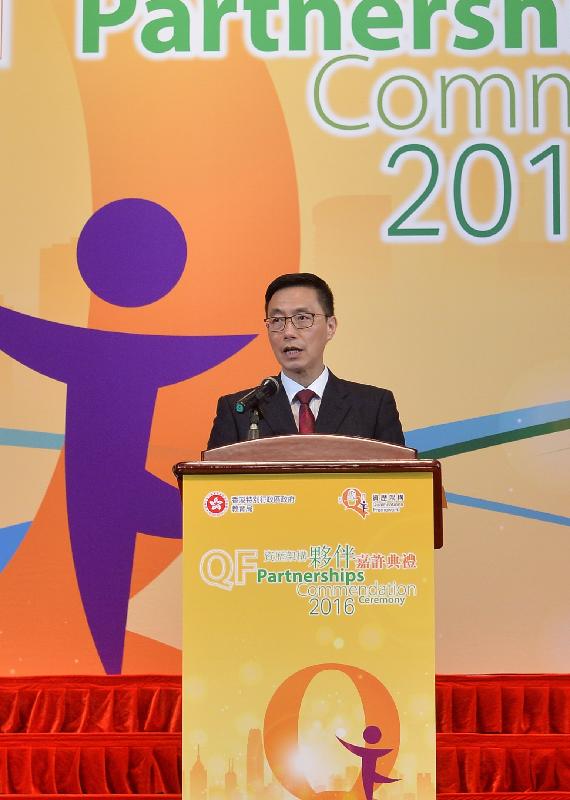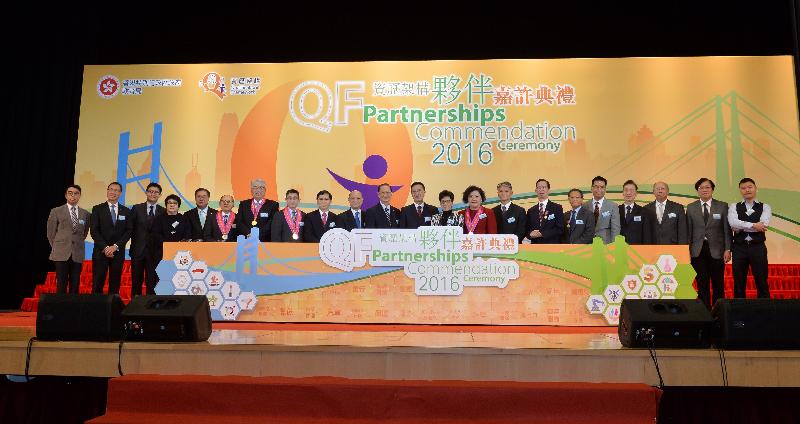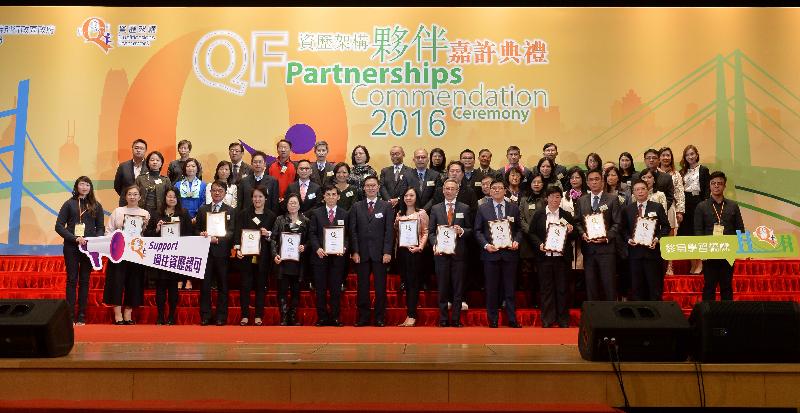Acting SED commends Qualifications Framework partners (with photos)
*******************************************************************
Speaking at the QF Partnerships Commendation Ceremony, Mr Yeung expressed his appreciation to the commended organisations for their active participation and support in the development of the QF in the past 10 years since its launch in 2008, resulting in pleasing outcomes.
He said, "At present, the Government has assisted 22 industries/sectors to set up Industry Training Advisory Committees, covering about 53 per cent of the total labour force in Hong Kong. Eighteen industries have developed their Specification of Competency Standards (SCS) while four other industries are expected to complete their SCS in one to two years. There are now more than 7 000 qualifications and their respective courses recognised under the QF and listed in the Qualifications Register available for learners. Fourteen industries have put into force the Recognition of Prior Learning (RPL) mechanism, through which more than 20 000 practitioners have obtained around 37 000 statements of attainment.
"To promote articulation between different qualifications attained by learners along their study pathways, the Education Bureau (EDB) has promulgated the policy, principles and operational guidelines for credit accumulation and transfer (CAT). We have also held a CAT Expo and several workshops earlier this year to foster co-ordination and co-operation among institutions and different sectors."
Looking forward, Mr Yeung said that the EDB will, with support from various sectors, promote, develop and improve the QF so that the QF can contribute even more in the promotion of lifelong learning and enhancement of the capability of the workforce.
The organisations were commended today for their outstanding performance in promoting RPL, developing SCS-based courses and adopting the QF in human resources development as well as actively publicising and promoting the QF.
Regarding the promotion of the RPL mechanism, the commended organisations have actively encouraged and supported their employees to apply for RPL qualifications to have their knowledge, skills and experience recognised under the QF.
As for the development of SCS-based courses, the commended organisations have adopted SCS in developing education and training courses. Some of them have developed or turned their in-house training programmes into SCS-based courses, so that the training can better suit the needs of the industries.
In respect of the application of the QF in human resources development, the commended organisations have actively applied the QF in recruitment, training and human resources management, and other areas, so that the industries can better manage and make use of human resources capital. Some organisations use SCS to design progression pathways for their respective industries, so as to help practitioners make future development plans.
Other organisations were commended for their active support in promoting the QF, including trade associations, trade unions, institutions, professional bodies, government departments and public organisations. These organisations have adopted the QF, through which more people have learned about the benefits of the QF in upgrading the quality of human resources.
The EDB completed last year the Comparability Study of the Hong Kong QF and the European QF (EQF) with the EQF Advisory Group, which established the comparability of levels between the Hong Kong QF and the EQF, thereby facilitating learner and labour mobility in the long run, as well as enhancing mutual understanding of the qualifications in the two regions among employers and institutions in Hong Kong and Europe. The EDB is now conducting referencing projects of the Hong Kong QF with the New Zealand, Scottish and Irish QFs.
The QF is a seven-level hierarchy covering qualifications in the academic, vocational, continuing education and training sectors. It aims to provide a transparent and easily assessable platform to promote lifelong learning and enhance the capability and competitiveness of the local workforce.
Ends/Tuesday, November 29, 2016
Issued at HKT 17:50
Issued at HKT 17:50
NNNN







